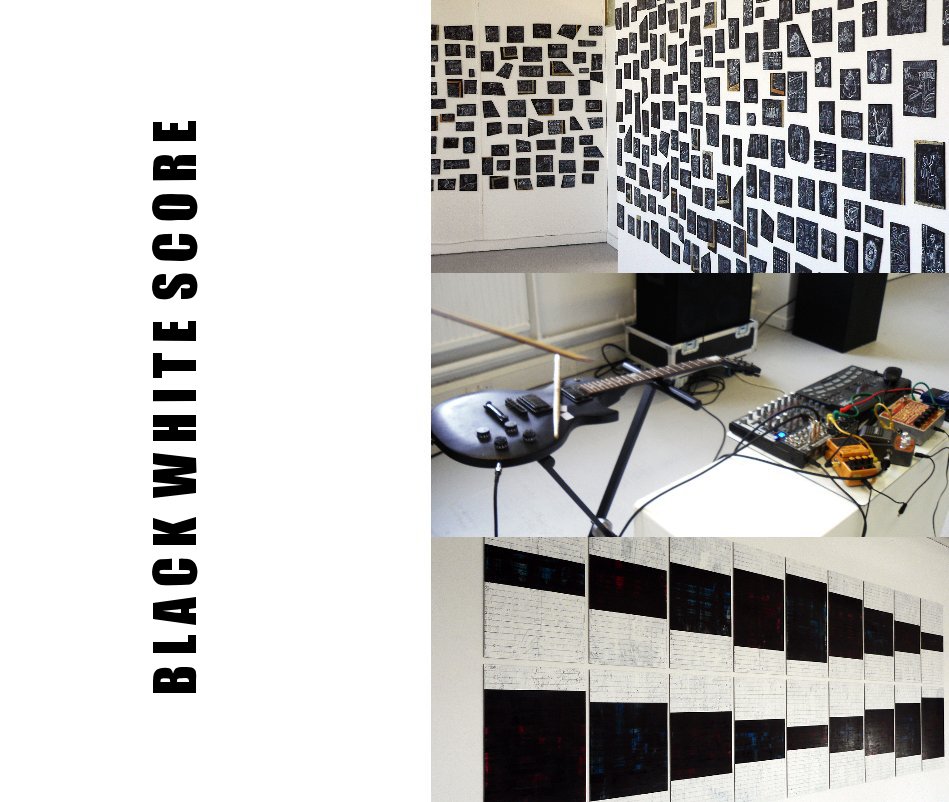B L A C K W H I T E S C O R E
by Colin Lawson, John Brown, Lee Riley
This is the price your customers see. Edit list price
About the Book
Oxford based sound artist Lee Riley manipulates and distorts sound to generate an aural realm that is stark, metallic and at times claustrophobic. His compositions Drowning Static (6 mins 30 secs) and The Fire Walker (13 mins 59 secs) are an accumulation of repeated sounds created using an electric guitar, violin bow and effects pedals. Drowning Static incites us to follow a pulsating drone as it slowly builds with increasing reverberation and density until eventually it is overcome by layers of static noise. The elongated chords of The Fire Walker take us through a darkening sound-scape where progressions of sound evolve and slowly collapse. In ‘Black White Score’ painters John Brown and Colin Lawson each responded visually to these two compositions with a series of large-scale visual scores rendered predominantly in black and white.
Lunatic Sum (acrylic on wood panels, 2011) by John Brown comprises a multitude of painted wooden fragments installed over two walls. Rendered like sketches on a blackboard, each fragment is entirely unique: a corroding city, a conniving dog, a hundred pieces of note paper on a breeze, two lunging figures, a cupcake, the word ‘giblets’. United only by their common presentation, the images are like singular moments lifted at random from some great unknown narrative. The companion piece to this work is Idiot Notes (acrylic ink graphite on cut paper, 2011). Installed on a temporary wall leaning in the gallery space the work comprises hundreds of drawings on paper. Here the changing subject matter plays out over fragmented shapes of paper cut and pasted to appear almost like flattened pieces of origami. John Brown’s fragments relate visually to Lee Riley’s austere units of sound. Just as Riley layers and builds his sounds until they become almost hypnotic in their repetition, the stratums of narrative proffered by Brown’s unique renderings become mesmerizing in their promise of a story which is ultimately indecipherable.
Colin Lawson’s formal approach to painting connects to Riley’s process of composition. The duration and weight of sounds are reflected in the measurement and surface textures of paint. The triptych Three (oil on wood, 2011) comprises vast strips of layered and scraped black and white paint. This stark composition relates to the simple yet intense tone-clusters present in the sound-scapes. Six (oil on canvas, 2010 - 2011) presents a large grid-like composition structuring a mass of monochrome brush strokes. The subtle visual complexities produced by contrasting dark with light within the grid relate to slight harmonic variations present in Riley’s music. Eighteen (oil on card, 2011) is composed in response to the action of a sound wave expanding and contracting. The progressions of colour, of composition and of surface textures communicate building tonal progressions while the discreet lines present in each panel respond to changing rhythms.
Present also were two digital animations constructed from paintings by each artist which evolve slowly in response to Riley’s music.
The exhibition opened with a live performance by Riley in the gallery space allowing visitors to watch how he constructs his sound-scapes and allowing him to improvise and respond to the paintings around him.
Chanté St Clair Inglis
Features & Details
- Primary Category: Arts & Photography Books
-
Project Option: Large Format Landscape, 13×11 in, 33×28 cm
# of Pages: 40 - Publish Date: Jul 24, 2011
About the Creator
An obsession with surface is the subject matter of my painting. Subtlety is a primary concern; a principle influenced by my fascination with ambient music, in particular its ability to envelop the listener without drawing attention to itself. From the early experiments of John Cage through to Brian Eno and present day recordings by Labradford and Marconi Union, I have been searching to find what might be considered a visual equivalent of this remarkable music. It is not my intention to illustrate this music however. The compositions are informed by responses to repeated notes and subtle variations in texture. The gradual introduction of stronger rhythms and the smaller, hidden sounds which surface periodically. My aim is to create an unobtrusive form of painting which will encourage attention rather than demand it.


